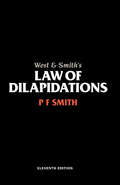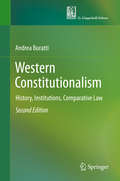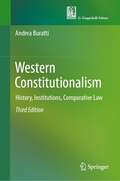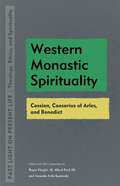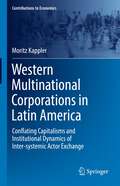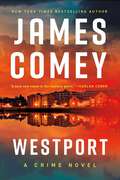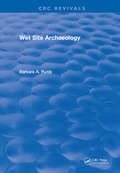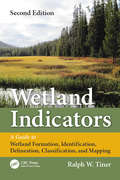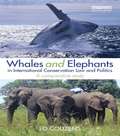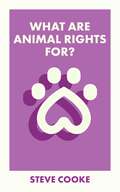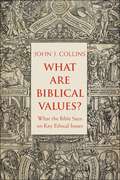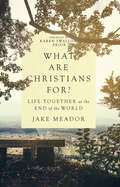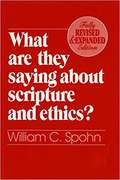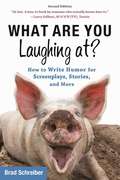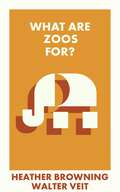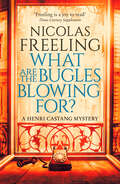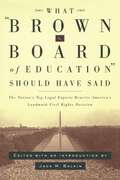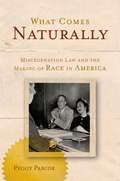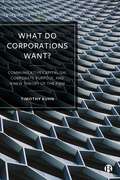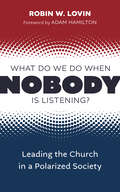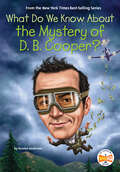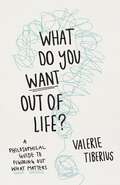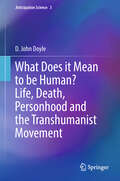- Table View
- List View
West & Smith's Law of Dilapidations
by PF Smith William Anthony WestDiscusses the legal principles governing dilapidated premises. This book examines the express implied and statutory repairing obligations of landlord and tenants. It looks at the remedies which are available to both parties to a lease if a repairing obligation is broken. It is useful for both professionals and students in the dilapidations field.
Western Constitutionalism: History, Institutions, Comparative Law
by Andrea BurattiThis innovative textbook provides an introduction into comparative constitutional law to undergraduate and graduate students. Combining a clear and practical explanation of the topics with scientific knowledge, the textbook analyzes the origins and the development of constitutional law in the Western world, as well as the structure and transformations of constitutional law, up to the present day. It also examines the theoretical roots and the historical premises of constitutionalism, and explores the foundation of constitutional law in Western countries since the Age of Revolutions and the 19th Century, underlining the different constitutional traditions. Furthermore, the textbook describes the transformations of constitutional law brought about by the transition toward pluralistic societies, and analyzes the political and legal features of constitutional democracies, taking into consideration the lessons learned in several constitutional environments in contemporary states. It also discusses the global expansion of the pattern of Western constitutionalism and the contemporary challenges in the age of globalization, focusing on the development of a European constitutional space.
Western Constitutionalism: History, Institutions, Comparative Law
by Andrea BurattiThis book explores the theoretical origins, historical foundation, political meaning, and legal development of western constitutionalism, as well as the structure and transformation of constitutional law in the Western World. Introducing the historical background of western constitutional traditions, it links this rich, conceptual framework with the legal arrangements of states’ constitutions and the current trends of the internationalization of constitutional law. Serving as a comprehensive introduction to constitutional studies, this book provides detailed information on the design of legal systems, while addressing the main critical, theoretical issues raised by constitutionalism in western democracies and in the global landscape. This new, third edition covers a broader scope, reflecting recent political and legal transformations, and is enriched in terms of didactic instruments for university students.
Western Monastic Spirituality: Cassian, Caesarius of Arles, and Benedict (Past Light on Present Life: Theology, Ethics, and Spirituality)
by Roger Haight, Alfred Pach, and Amanda Avila KaminskiWestern Monastic Spirituality presents three authors as individuals, certainly, but also as textual informants who, like road markers, represent a line of the development of a Western monastic spiritual tradition. John Cassian (ca. 360–435) helped bring the wisdom of northern Egyptian ascetical life of the late fourth century to southern France in the early fifth century. Caesarius of Arles (468/470–542), drawing on his own monastic experience and Augustine’s monastic rule, composed a rule for a women’s monastery in the city of Arles. Not many years later, Benedict wrote the most influential rule in Western monasticism, one that still regulates the lives of monks today all over the world. These three texts, when looked at serially and together, offer a theology of monastic spirituality, an example of a relatively short but comprehensive early monastic rule, and a present day Benedictine interpretation of how Benedict’s monastic spirituality can be summed up in a short present day digest of his rule. Reflection on early Western monasticism retrieves some basic Christian spiritual values that should inform life today outside the monastery in a busy, secular culture.
Western Multinational Corporations in Latin America: Conflating Capitalisms and Institutional Dynamics of Inter-systemic Actor Exchange (Contributions to Economics)
by Moritz KapplerThis book advances the debate on socio-economic development and multinational corporations (MNCs). It provides an actor-centered perspective and develops the framework called ‘Conflating Capitalisms’ that allows for a better understanding of both MNC-induced institutional change in the host country and the subsequent impact on local development. The book uses the empirical case of Western MNCs in Latin America. It applies a sequential mixed-method design, including a large-scale elite survey on corporate behavior and in-depth, semi-structured interviews with local decision-makers on the institutionalization of German dual vocational training (DVT) in Brazil.The book presents strong evidence for both behavioral contradiction in the host country - with MNCs showing alien-to-the-system behavior - and subsequent actor-induced institutional change, with varied developmental impact. Additionally, the book offers novel insights into MNCs’ handling of missing complementary institutions and the institutionalization process of coordinated practices in Latin America.This book appeals to scholars, students, and practitioners who are interested in advancing the field of development and MNCs.
Westport
by James ComeyFormer FBI director James Comey takes readers into the world of high finance and corporate espionage in this riveting thriller. A red canoe sits abandoned on Seymour Rock, right where the Saugatuck River hits the Long Island Sound. The elegantly dressed corpse of a woman lies inside…. It’s been two years since Nora Carleton left the job she loved at the US Attorney’s Office to become lead counsel at Saugatuck Associates, the world’s largest hedge fund. The career change also meant a change of scenery, relocating her to Westport, Connecticut, fifty miles north of New York City. But it was worth it to get her daughter, Sophie, away from the city. Plus, she likes the people she works with. Especially Helen, who recruited Nora because of her skills as an investigator. Then Nora's new life falls apart when a coworker is murdered and she becomes the lead suspect. Nora calls in her old colleagues from the US Attorney’s Office, Mafia investigator Benny Dugan and attorney Carmen Garcia. To clear Nora’s name, Benny and Carmen hunt for the true killer's motive, but it seems nearly everyone at Saugatuck has secrets worth killing for. As Benny sets out to interrogate her colleagues, Nora examines her history with the company to determine who set her up to take the fall. A suspenseful and intriguing tale of high finance and murder, Westport features the characters first introduced in James Comey’s debut novel Central Park West but can also be read on its own. It further establishes Comey as “a bold new talent in the mystery genre” (Harlan Coben).
Wet Site Archaeology
by Barbara A. PurdyThis volume, the result of an International Conference on Wet Site Archaeology funded by the National Endowment for the Humanities, explores the rewards and responsibilities of recovering unique assemblages from water-saturated deposits. Characteristics common to all archaeological wet sites are identified from Newfoundland to Chile, Polynesia to Florida, and from the Late Pleistocene to the Twentieth Century. Topics include innovative excavation and preservation methods; the need for adequate funding to preserve and analyze the abundant biological and cultural remains recovered only at archaeological wet sites; expanded knowledge of past environments, subsistence, technologies, artistic expressions, skeletal structure, and pathologies; the urgency to inform developers and governmental bodies about the invisible heritage entombed in wetlands that is often destroyed before it can be investigated; a formula for establishing priorities for excavating wet sites; and how to determine when enough of a wet site has been sampled.Many famous sites and discoveries are described in this volume, including Herculaneum, Hoko River, Hontoon Island, Key Marco, Monte Verde, Ozette, Somerset Levels, Windover, bog bodies of Northern Europe, and lake dwellers of Switzerland. Professional and amateur archaeologists, as well as anyone interested in archaeology or the significance of wet site archaeology will find this book fascinating.
Wetland Indicators: A Guide to Wetland Formation, Identification, Delineation, Classification, and Mapping, Second Edition
by Ralph W. TinerUnderstand the current concept of wetland and methods for identifying, describing, classifying, and delineating wetlands in the United States with Wetland Indicators - capturing the current state of science's role in wetland recognition and mapping.Environmental scientists and others involved with wetland regulations can strengthen their knowledge about wetlands, and the use of various indicators, to support their decisions on difficult wetland determinations. Professor Tiner primarily focuses on plants, soils, and other signs of wetland hydrology in the soil, or on the surface of wetlands in his discussion of Wetland Indicators.Practicing - and aspiring - wetland delineators alike will appreciate Wetland Indicators' critical insight into the development and significance of hydrophytic vegetation, hydric soils, and other factors. Features Color images throughout illustrate wetland indicators. Incorporates analysis and coverage of the latest Army Corps of Engineers delineation manual. Provides over 60 tables, including extensive tables of U.S. wetland plant communities and examples for determining hydrophytic vegetation.
Whales and Elephants in International Conservation Law and Politics: A Comparative Study (Routledge Research In International Environmental Law Ser.)
by Ed CouzensWhales and elephants are iconic giants of the marine and terrestrial animal world. Both are conspicuous representatives of wildlife conservation. The issues of whaling and the ivory trade are closely linked, both legally and politically, in many ways; some obvious, and some surprising. The treatment of both whales and elephants will be politically and legally contentious for years to come, and is of great significance to conservation in general. This book examines the current state of international environmental law and wildlife conservation through a comparative analysis of the treatment of whales and elephants. In particular, it describes the separate histories of international governance of both whales and elephants, presenting the various treaties through which conservation has been implemented. It is shown that international environmental law is influenced and shaped by important political actors – many with opposing views on how best conservation, and sustainable development, principles are to be implemented. Modern environmental treaties are changing as weaknesses and loopholes are exposed in older, and possibly outdated, treaties such as the Convention on International Trade in Endangered Species of Wild Fauna and Flora (CITES) and the International Convention for the Regulation of Whaling (ICRW). Such weaknesses can be seen in the efforts made by some states to circumvent or weaken CITES and the International Whaling Commission and to resume commercial whaling, and further in the efforts of countries to resume trade in ivory. The argument is made that the Convention on Biological Diversity could be used to begin reconciling opposed views and to focus conservation efforts. The argument is made that effective conservation of species cannot be achieved through individual treaties, but only through a synergistic approach involving multilateral environmental agreements – 'ecosystems of legal instruments'.
What Are Animal Rights For?
by Steve CookeHow should we treat animals? The long-held belief that other animals exist solely for human use has undergone radical challenge in the past half century. How much further do we need to go to minimize, and even eliminate, animal suffering? The field of animal rights raises big questions about how humans treat the other animals with which we share the planet. These questions are becoming more pressing as livestock farming exerts an ever-greater toll on the planet and the animals themselves, and we learn more about their capacity to think and experience pain. This book shows why animals ought to have greater rights and what the world might look like if they did.
What Are Biblical Values?: What the Bible Says on Key Ethical Issues
by John CollinsAn illuminating exploration of the Bible and many of our most contentious contemporary issues Many people today claim that their positions on various issues are grounded in biblical values, and they use scriptural passages to support their claims. But the Bible was written over the course of several hundred years and contains contradictory positions on many issues. The Bible seldom provides simple answers; it more often shows the complexity of moral problems. Can we really speak of “biblical values”? In this eye-opening book, one of the world’s leading biblical scholars argues that when we read the Bible with care, we are often surprised by what we find. Examining what the Bible actually says on a number of key themes, John Collins covers a vast array of topics, including the right to life, gender, the role of women, the environment, slavery and liberation, violence and zeal, and social justice. With clarity and authority, he invites us to dramatically reimagine the basis for biblical ethics in the world today.
What Are Christians For?: Life Together at the End of the World
by Jake MeadorWhat does a Christian political witness look like in our day? Politics ought to be defined by fidelity to the common good of all the members of society. But our modern Western politics are defined by a determination to bend the natural world and human life to its own political and economic ends. This wholesale rejection of the natural order is behind the dominant revolutions in our history, and defines our experience in Western society today���our racialized hierarchy, modern industry, and the sexual revolution. In What Are Christians For?, Jake Meador lays out a proposal for a Christian politics rooted in the givenness and goodness of the created world. He is uninterested in the cultural wars that have so often characterized American Christianity. Instead, he casts a vision for an ordered society that rejects the late modern revolution at every turn and is rooted in the natural law tradition and the great Protestant confessions. Here is a political approach that is antiracist, anticapitalist, and profoundly pro-life. A truly Christian political witness, Meador argues, must attend closely to the natural world and renounce the metallic fantasies that have poisoned common life in America life for too long.
What Are They Saying About Scripture and Ethics
by William SpohnTraces recent developments in the turn to Scripture in Christian ethics among Protestant and Roman Catholic theologians. Special attention is paid to new questions in hermeneutics, spirituality, feminist and Latin American liberation theologies, and character ethics.
What Are You Laughing At?: How to Write Humor for Screenplays, Stories, and More
by Brad Schreiber Chris Vogler“People have forgotten how to be funny,” says Chris Vogler in his foreword to What Are You Laughing at? Luckily, experienced and award-winning humor writer Brad Schreiber is here to remind us all how it’s done. If laughter is the best medicine, be prepared to feel fit as a fiddle after perusing these pages. Brad’s clever wit and well-timed punch lines are sure to leave you grasping your sides, while his wise advice will ensure that you’re able to follow in his comedic footsteps.With more than seventy excerpts from such expert prose and screenwriters as Woody Allen, Steve Martin, and Kurt Vonnegut Jr., as well as unique writing exercises for all situations, this comprehensive tutorial will teach you how to write humor prose for any literary form, including screenwriting, story writing, theater, television, and audio/radio. Additionally, readers are given sage advice on different tactics for writing comedic fiction versus comedic nonfiction. Some of the topics discussed include:Life experience versus imaginationHow to use humor to develop theme/setting, character, and dialogueRhythm and sound of wordsVulgarity and bad tasteHow to market your humor prose in the digital marketThoroughly revised and updated, and with new information on writing short, humorous films, What Are You Laughing at? is your endless source to learning the art of comedy.
What Are Zoos For? (What Is It For?)
by Walter Veit Heather BrowningAre zoos an anachronism in the 21st century when we can watch animals in their natural habitat, close-up from our couches without worrying about cruelty? Should they go the way of other bygone era ‘spectacles’ and ‘attractions’ that we now regard as barbaric? There are vocal campaigners and activists who believe so. Heather Browning and Walter Veit disagree, but they acknowledge there is a case to be answered. In What are Zoos for? they test the common justifications for zoos (entertainment, education, research, conservation) against the evidence and suggest what the best zoos of the future should look like to ensure that they are primarily for animals and not just for people.
What Are the Bugles Blowing For? (The Henri Castang Mysteries)
by Nicolas FreelingFrom an Edgar Award–winning British crime novelist, this unsettling homicide investigation features the unorthodox French detective Henri Castang.On a sultry summer night in a French provincial city, Insp. Henri Castang is summoned from his office at the Police Judiciaire to the site of a triple murder. The killer? A husband who came home unexpectedly to discover his wife and daughter in bed with another man. A crime of passion? Perhaps. Except the murderer in question, wealthy financier Gilbert La Touche, is cool and remote. His confession is as factual and bloodless as the crime is violent and deeply disturbing. As a detective, Castang must play by the rules to protect himself. But for an unconventional cop like Castang, that is virtually impossible. After all, there’s more to murder than a few corpses and a killer, and Castang will follow every twist until he gets to the heart of the evil at hand.Praise for Nicolas Freeling“Nicolas Freeling . . . liberated the detective story from page-turning puzzler into a critique of society and an investigation of character.” —The Daily Telegraph“Freeling rewards with his oblique, subtly comic style.” —Publishers Weekly
What Blood Won't Tell: A History of Race on Trail in America
by Ariela J. GrossIs race something we know when we see it? In 1857, Alexina Morrison, a slave in Louisiana, ran away from her master and surrendered herself to the parish jail for protection. Blue-eyed and blond, Morrison successfully convinced white society that she was one of them. When she sued for her freedom, witnesses assured the jury that she was white, and that they would have known if she had a drop of African blood. Morrison’s court trial—and many others over the last 150 years—involved high stakes: freedom, property, and civil rights. And they all turned on the question of racial identity. Over the past two centuries, individuals and groups (among them Mexican Americans, Indians, Asian immigrants, and Melungeons) have fought to establish their whiteness in order to lay claim to full citizenship in local courtrooms, administrative and legislative hearings, and the U.S. Supreme Court. Like Morrison’s case, these trials have often turned less on legal definitions of race as percentages of blood or ancestry than on the way people presented themselves to society and demonstrated their moral and civic character. Unearthing the legal history of racial identity, Ariela Gross’s book examines the paradoxical and often circular relationship of race and the perceived capacity for citizenship in American society. This book reminds us that the imaginary connection between racial identity and fitness for citizenship remains potent today and continues to impede racial justice and equality.
What Brown v. Board of Education Should Have Said: The Nation's Top Legal Experts Rewrite America's Landmark Civil Rights Decision
by Jack M. BalkinLegal experts rewrite the landmark court decisionBrown v. Board of Education, the Supreme Court's landmark 1954 decision ordering the desegregation of America's public schools, is perhaps the most famous case in American constitutional law. Criticized and even openly defied when first handed down, in half a century Brown has become a venerated symbol of equality and civil rights. Its meaning, however, remains as contested as the case is celebrated. In the decades since the original decision, constitutional interpreters of all stripes have found within it different meanings. Both supporters and opponents of affirmative action have claimed the mantle of Brown, criticizing the other side for betraying its spirit. Meanwhile, the opinion itself has often been criticized as bland and uninspiring, carefully written to avoid controversy and maintain unanimity among the Justices. As the 50th anniversary of Brown approaches, America's schools are increasingly divided by race and class. Liberals and conservatives alike harbor profound regrets about the development of race relations since Brown, while disagreeing heatedly about the proper role of the courts in promoting civil equality and civil rights. In this volume, nine of America's top constitutional and civil rights experts have been challenged to rewrite the Brown decision as they would like it to have been written, incorporating what they now know about the subsequent history of the United States but making use of only those sources available at the time of the original decision. In addition, Jack Balkin gives a detailed introduction to the case, chronicling the history of the litigation in Brown, and explaining the current debates over its legacy. Contributors include: Bruce Ackerman, Jack M Balkin, Derrick A. Bell, Drew S. Days, John Hart Ely, Catharine A. MacKinnon, Michael W. McConnell, Frank I Michelman, and Cass R. Sunstein.
What Comes Naturally: Miscegenation Law And The Making Of Race In America
by Peggy PascoeA long-awaited history that promises to dramatically change our understanding of race in America, What Comes Naturally traces the origins, spread, and demise of miscegenation laws in the United States-laws that banned interracial marriage and sex, and which were enacted and applied not just in the South but throughout most of the country, in the West, the North, and the Midwest. Beginning in the Reconstruction era, when the term miscegenation first was coined, Peggy Pascoe traces the creation of a racial hierarchy that bolstered white supremacy and banned the marriage of Whites to Chinese, Japanese, Filipinos, and American Indians, as well as the marriage of Whites to Blacks. She takes readers into the lost world of miscegenation law, showing how legislators, lawyers, and judges used ideas about gender and sexuality to enact and enforce miscegenation laws. Judges labeled interracial marriages "unnatural," marriage license clerks made them seem statistically invisible, and newspaper reporters turned them into sensational morality tales. Taken together, their actions embedded a multiracial version of white supremacy deep in the heart of the modern American state. Pascoe ends not simply with the landmark 1967 case of Loving v. Virginia, in which the U. S. Supreme Court finally struck down miscegenation laws, but with a look at the implications of the ideal of colorblindness that replaced them. Moving effortlessly from the lives of interracial couples, the politicking of the NAACP, and the outraged objections of Filipino immigrants to the halls of state legislatures and rulings of the Supreme Court, What Comes Naturally transcends older interpretations of bans on interracial marriage as a southern story in black and white to offer a stunning account of the national scope and multiracial breadth of America's tragic history of miscegenation laws.
What Do Corporations Want?: Communicative Capitalism, Corporate Purpose, and a New Theory of the Firm
by Timothy Kuhn'Corporate purpose' has become a battleground for stakeholders’ competing desires. Some argue that corporations must simply generate profit; others suggest that we must make them create social change.Leading organization studies scholar Timothy Kuhn argues that this 'either/or' thinking dramatically oversimplifies matters: today’s corporations must be many things, all at once.Kuhn offers a bold new Communicative Theory of the Firm to highlight the authority that creates corporations’ identities and activities. The theory provides a roadmap for navigating that battleground of competing desires to produce more responsive corporations.Drawing on communicative and new materialist theorizing, along with three insightful case studies, this book thoroughly redefines our understandings of what corporations are 'for'.
What Do We Do When Nobody Is Listening?: Leading the Church in a Polarized Society
by Robin W. LovinA trusted senior statesman in Christian ethics and ministry addresses the crisis of political polarization threatening the existence of the church. Polarization and political gridlock have been the norm in the United States for decades. As that reality seeps into every aspect of our society, churches find themselves not only affected, but often at the very center of the conflict. Rather than remaining places of inclusive community and generous dialogue, our sanctuaries have too often become ground zero of the culture wars. What can pastors do to restore the church&’s witness to the unity of all things in God—especially when it feels like members of the congregation would rather position the church&’s identity firmly on one side of the political spectrum or the other? And how can church leaders maintain peace while speaking the truth on important social issues—without either alienating parishioners who disagree or resorting to inane bothsiderism? Widely respected pastor and ethicist Robin Lovin offers sage counsel in this helpful book, arguing that to resist the trend of polarization in our church we must rediscover how the gospel teaches us to understand ourselves, our neighbors, and the purpose of politics. In part one, Lovin provides an overview of the situation in which we find ourselves, showing how polarization developed over recent decades and how, in both our society and our churches, we have adapted to division as the norm. In part two, he considers how Christians can shape a different response by learning to listen—to the Word of God, to the world, and to those who are not usually heard. With questions for discussion and reflection aligned with the content of each chapter, What Do We Do When Nobody Is Listening? provides an accessible roadmap for navigating out of the morass of polarization into a brighter future of church unity, during election seasons and beyond.
What Do We Know About the Mystery of D. B. Cooper? (What Do We Know About?)
by Kirsten Anderson Who HQFind out what really happened when a strange man hijacked an airplane in 1971 and then parachuted out of it, never to be seen again. What is the truth behind the mystery of the man who came to be known as D. B. Cooper?On November 24, 1971, an unidentified man hijacked an airplane that was flying from Portland, Oregon, to Seattle, Washington. He demanded $200,000 and told a flight attendant that he had weapons. After stopping in Seattle, the hijacker was given the money and he released the attendants. But he demanded that the pilots stay on-board, refuel, and fly him to Mexico City. Just thirty minutes after the plane took off, the man jumped out of the aircraft and parachuted away...never to be seen or heard from again. Did he escape with the money? Did he even survive the jump? Over fifty years later, the FBI still does not know what happened to the man they call "D. B. Cooper." Find out what we do know about one of America's most famous, unsolved mysteries in this book for young readers.
What Do We Owe Other Animals?: A Debate (Little Debates about Big Questions)
by Bob Fischer Anja JauernigPhilosophers Bob Fischer and Anja Jauernig agree that human society often treats animals in indefensible ways and that all animals morally matter; they disagree on whether humans and animals morally matter equally. In What Do We Owe Other Animals?: A Debate, Fischer and Jauernig square off over this central question in animal ethics. Jauernig defends the view that all living beings morally matter equally and are owed compassion, on account of which we are also obligated to adopt a vegan diet. Fischer denies that we have an obligation to become vegans, and argues for the position that humans morally matter more than all other living creatures. The two authors each offer a clear, well-developed opening statement, a direct response to the other’s statement, and then a response to the other’s response. Along the way, they explore central questions, like: What kind of beings matter morally? What kind of obligations do we have towards other animals? How demanding can we reasonably expect these obligations to be? Do our individual consumer choices, such as the choice to purchase factory-farmed animal products, make a difference to the wellbeing of animals? The debate is helpfully framed by introductions and conclusions to each of the major parts and by smaller introductions to each of the sub-sections. A Foreword by Dustin Crummett sets the context for the debate within a larger discussion of sentience, moral standing, reason-guided compassion, and the larger field of animal ethics. Key Features • Showcases the presentation and defense of two points of view on the moral worth of non-human animals• Provides frequent summaries of previously covered material• Includes a topically-organized list of Further Readings and a Glossary of all specialized vocabulary
What Do You Want Out of Life?: A Philosophical Guide to Figuring Out What Matters
by Valerie TiberiusA short guide to living well by understanding better what you really value—and what to do when your goals conflictWhat do you want out of life? To make a lot of money—or work for justice? To run marathons—or sing in a choir? To have children—or travel the world? The things we care about in life—family, friendship, leisure activities, work, our moral ideals—often conflict, preventing us from doing what matters most to us. Even worse, we don’t always know what we really want, or how to define success. Blending personal stories, philosophy, and psychology, this insightful and entertaining book offers invaluable advice about living well by understanding your values and resolving the conflicts that frustrate their fulfillment.Valerie Tiberius introduces you to a way of thinking about your goals that enables you to reflect on them effectively throughout your life. She illustrates her approach with vivid examples, many of which are drawn from her own life, ranging from the silly to the serious, from shopping to navigating prejudice. Throughout, the book emphasizes the importance of interconnectedness, reminding us of the profound influence other people have on our lives, our goals, and how we should pursue them. At the same time, the book offers strategies for coping with obstacles to realizing your goals, including gender bias and other kinds of discrimination.Whether you are changing jobs, rethinking your priorities, or reconsidering your whole life path, What Do You Want Out of Life? is an essential guide to helping you understand what really matters to you and how you can thoughtfully pursue it.
What Does it Mean to be Human? Life, Death, Personhood and the Transhumanist Movement (Anticipation Science #3)
by D. John DoyleThis book is a critical examination of the philosophical and moral issues in relation to human enhancement and the various related medical developments that are now rapidly moving from the laboratory into the clinical realm. In the book, the author critically examines technologies such as genetic engineering, neural implants, pharmacologic enhancement, and cryonic suspension from transhumanist and bioconservative positions, focusing primarily on moral issues and what it means to be a human in a setting where technological interventions sometimes impact strongly on our humanity. The author also introduces the notion that death is a process rather than an event, as well as identifies philosophical and clinical limitations in the contemporary determination of brain death as a precursor to organ procurement for transplantation. The discussion on what exactly it means to be dead is later applied to explore philosophical and clinical issues germane to the cryonics movement. Written by a physician/ scientist and heavily referenced to the peer-reviewed medical and scientific literature, the book is aimed at advanced students and academics but should be readable by any intelligent reader willing to carry out some side-reading. No prior knowledge of moral philosophy is assumed, as the various key approaches to moral philosophy are outlined early in the book.
